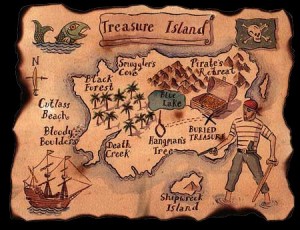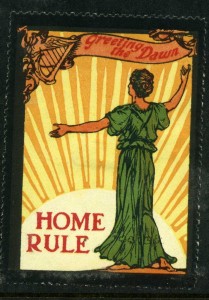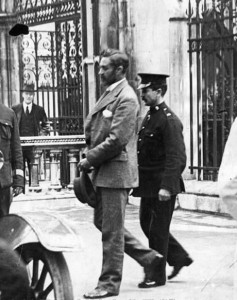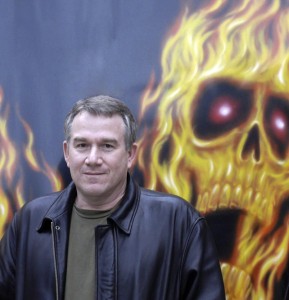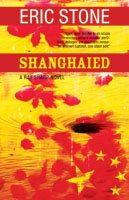By Paul Levine 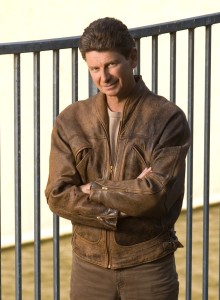
Today TKZ is thrilled to welcome author Paul Levine, who has been nominated for the Edgar, Macavity, International Thriller Writers, and James Thurber awards. Today he discusses a subject near and dear to my heart, illegal immigration (although I confess to being green with envy over his earlier release date, considering the fact that my next opus treads similar ground). Read on for a true immigration story…
“Let me get this straight,” the Hollywood producer said. “You dedicated your book to an illegal alien.”
“A Mexican woman,” I said. “She floated up the New River on an inner tube with her little boy.”
“I didn’t know rivers ran north.”
An odd statement, I thought. Focusing on the flow of water rather than the flow of people. “Some rivers do,” I told him. “The Nile. The Monongahela. The New River between Mexicali and the Salton Sea.”
The producer licked his thumb and turned to the dedication page. We were sitting in his bungalow on the Warner lot. Outside the window, I had a fine view of the water tower.
He read aloud: “‘To the woman carrying a rucksack, clutching her child’s hand, and kicking up dust as she scrambled along a desert trail near Calexico, California.’”
He looked puzzled. That happens to people who don’t know rivers can run north. “I still don’t get it.”
“The boy and his mother. They’re the heart and soul of ‘Illegal.’”
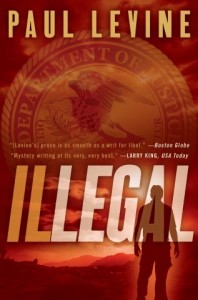 Then I told him the story behind the story.
Then I told him the story behind the story.
Three years ago, the news was filled with horror tales of border crossings gone bad. Families heading north were attacked by Mexican bandits or robbed by their own coyotes. People locked inside truck trailers literally baked to death. Women were beaten, kidnapped, and forced into sexual slavery. The hellish desert took its own toll, leaving the Border Patrol to rescue illegals as well as arrest them.
I wanted to write a novel set against the backdrop of illegal immigration and human trafficking, but what story would I tell? With me, the characters come first. When their lives are etched in my mind like petroglyphs on a cave wall, they tell me the story. I already had the protagonist. Jimmy (Royal) Payne, a down-and-out Los Angeles lawyer, would cross borders of his own while encountering immigrants, coyotes, corrupt cops, and human traffickers. But what was the spine of the story? I didn’t know.
On a day of blast furnace heat, I drove south through the desert, roadkill armadillos roasting on the pavement. To the east was the polluted Salton Sea. To the west, the Borrego Badlands. As I neared Calexico, the yellow “Caution” signs started popping up. Silhouettes of a father, mother, and daughter scampering across the road. The message: Be on the lookout for “pollos.” Cooked chickens in border slang. Coyotes are “polleros,” or chicken wranglers. Many of the signs were peppered were gunshots.
Bienvenidos a los Estados Unidos. Yes, welcome indeed.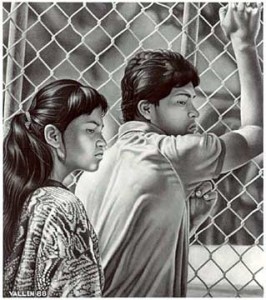
I thought of Freddy Fender singing Across the Borderline, an achingly sad tale about the “broken promised land.”
“And when it’s time to take your turn
Here’s one lesson that you must learn
You could lose more than you’ll ever hope to find.”
Near the border, I took a wrong turn onto a side road that dead-ended at the New River, a steaming current of raw sewage and toxic runoff that carries hepatitis, typhoid, polio, and cholera. Tree limbs bleached the color of skeletons floated in the water, which bubbled with a poisonous foam. Knowing of the Border Patrol’s reluctance to dive in, some hardy – or foolhardy – illegals swim with the current, white garbage bags over their heads to blend in with the noxious foam.
Getting out of the car, I saw no swimmers this day. But a large inner tube was grounded in the shallows. A striking, dark-haired woman in her early 30’s and a boy of 10 or so were picking their way across the rocks to shore. Backpacks, sneakers, and a gallon jug of water. Judging from the ease with which the woman hefted the jug, it was nearly empty.
I shouted out a friendly “Hola.” The mother froze. The boy stepped in front of her, a gesture of protection, the child on the verge of becoming a man. I ducked into my car, came out with a Thermos filled with iced tea. I held it up, a universal offer of friendship to travelers. They stood motionless. I walked toward them, but they started backing up…toward the river. I stopped short, placed the Thermos on the ground, dug into my wallet and placed several twenties under the Thermos. A puny gesture, given the enormity of their task.
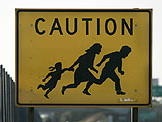 I returned to my air-conditioned car and headed for the main highway. Through my rear view mirror, I saw mother and son walking north along the dusty road. The boy carried the Thermos.
I returned to my air-conditioned car and headed for the main highway. Through my rear view mirror, I saw mother and son walking north along the dusty road. The boy carried the Thermos.
I didn’t know their names, so I gave them new ones. Marisol and Tino Perez. I imagined them wrenched apart in a border crossing gone-to-hell. They completed my trio of main characters. A shady lawyer. A missing woman. A lost boy. Their antagonist would be a wealthy California mega-farmer with a twisted vision of his own power.
“Illegal” is about choices. Will Jimmy Payne risk his life for two strangers or retreat into his own solitary world? The book is also about greed and corruption, revenge and redemption, all set in the dark world of human trafficking.
When I was finished, the producer said, “Why’d you help those illegals instead of calling the Border Patrol?”
“The Bible says, ‘Do not neglect to show hospitality to strangers, for by this, some have entertained angels.’”
“Don’t go biblical on me. Biblical doesn’t sell, except for Mel Gibson, and he’s so yesterday, he’s last year.”
The producer looked out the window where a motorized cart was hauling two-by-fours to a set under construction.
“This book got some blood and guts? Like ‘No Country for Old Men.’” 
“The hero gets horsewhipped.”
“That’s good. Like Marlon Brando in ‘One-Eyed Jacks.’”
“But it’s more like ‘Chinatown,’” I said, figuring movie analogies kept the producer in his comfort zone. “The abuse of power. Corruption of the flesh.”
He seemed to think it over a moment. “Can we lose that polluted river?”
“Why? Because it flows north?”
“Because no one will believe those illegals would risk it. Just why the hell would someone do that?”
“You nailed it,” I said. “The reason for the book. The reason for the dedication. It makes you ask, ‘Why the hell would someone do that?’”
You can read an excerpt of “Illegal,” sign up for Paul’s newsletter, and win cool prizes at http://www.paul-levine.com
Paul Levine’s new novel, ILLEGAL, has been praised as “the most original, offbeat and wholly entertaining novel of the year so far,” by the Providence (R.I.) Journal. Levine also wrote four novels featuring squabbling Miami trial lawyers Steve Solomon and Victoria Lord. SOLOMON vs. LORD was nominated for the Macavity Award and for the Thurber Prize for American Humor. THE DEEP BLUE ALIBI was nominated for an Edgar, and KILL ALL THE LAWYERS was a finalist for the International Thriller Writers Award. He was awarded the John D. MacDonald award for Florida fiction for his “Jake Lassiter” novels.A screenwriter, Paul wrote 21 episodes of the CBS military series “JAG” and co-created and co-executive produced “First Monday,” a drama set at the Supreme Court, starring James Garner and Joe Mantegna.
 t thin on the ground at the Langley-Hawthorne house, so I thought ‘who would I want over for dinner to help liven things up?’ To limit myself I went for ‘dead writers’ only – much more fun (and, hey, I am the historical author after all). Although the choices are vast, I also wanted to focus on those who would inspire me the most as I try (once the world stops spinning) to finish the third Ursula Marlow book.
t thin on the ground at the Langley-Hawthorne house, so I thought ‘who would I want over for dinner to help liven things up?’ To limit myself I went for ‘dead writers’ only – much more fun (and, hey, I am the historical author after all). Although the choices are vast, I also wanted to focus on those who would inspire me the most as I try (once the world stops spinning) to finish the third Ursula Marlow book. 









